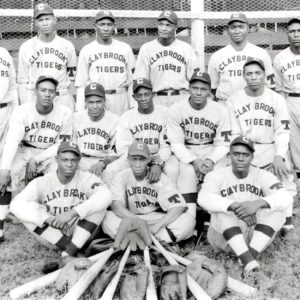calsfoundation@cals.org
John C. Claybrook (1872–1951)
John C. Claybrook was a lumberman, farmer, baseball team owner, and one of the most successful African American businessmen of his time in the South. He built a town around his farming and logging operation in eastern Arkansas and eventually gained national attention for being among the first African Americans in the South since Reconstruction, if not the first, chosen to sit on a jury trying black men for the rape of a white woman.
John Claybrook was born on June 11, 1872, in Florence, Alabama. His parents’ names and occupations are unknown. He ran away to Memphis when he was thirteen to find work, which he soon found as a laborer on riverboats. After renting and working some plantation land in Mississippi, Claybrook moved to Crittenden County in eastern Arkansas around 1905.
Claybrook was reportedly married four times, though the dates of his marriages are unknown. He had three daughters and one son.
Claybrook was illiterate, although the 1920 Census states that he could read and write. His first wife, Rose, tried to teach him to read, but at best he was only able to sound out some words in a newspaper. He was a hard worker, however, with extraordinary business sense.
He saw great potential in clearing the land in Crittenden County for timber. In Topaz (Crittenden County), Claybrook began his logging and farming operation; the town developed around his holdings. By 1916, he owned two acres of land and was clearing the timber and planting cotton. Claybrook soon became well known as a reliable and productive timber contractor and farmer. At the height of his career in the mid-1930s, his land holdings in Crittenden County had reportedly grown to a plantation of 3,500 acres.
In 1929, the Harmon Foundation, in cooperation with the Commission on Race Relations of the Federal Council of Churches, gave Claybrook the Harmon Award for his business success. His success in the lumber industry was further validated when a congressional committee investigating the lumber industry asked him to provide expert testimony. The best reflection of Claybrook’s success was Claybrook, the town that he built around his logging and farming operation. The town included a boarding house, clubhouse, farm store, sawmill, and baseball stadium. It was located just southwest of West Memphis (Crittenden County). Little remains of the once bustling community.
Claybrook formed a semi-professional baseball team in the late 1920s, hoping that his son, John Jr., who liked city life and was eager to move north, would stay on the farm. The stadium was built in the early 1930s, and Claybrook began recruiting players, including local athletes, his own laborers, and professional players from Memphis and St. Louis.
The Claybrook Tigers were well known throughout the South for playing, and often beating, Negro League teams such as the Memphis Red Sox, the Birmingham Black Barons, the Cuban All Stars, and the Kansas City Monarchs. Though the Tigers were not an official member of the Negro Leagues, a number of Negro League stars such as Theolic Smith, Walter Calhoun, John Hundley, Emmitt Wilson, and Ted “Double Duty” Radcliffe played for the Tigers. The team folded in 1938.
In 1938, Claybrook sat on a Crittenden County criminal jury, becoming the county’s first black juror since 1888. Local court officials reported at the time that he was probably the first black jurist in the entire South since Reconstruction to sit on a jury trying black men for the rape of a white woman. Along with the eleven other jurors, Claybrook voted to send the two black men, Frank Carter and Theo Thomas, to the electric chair.
By 1940, Claybrook had left Crittenden County to begin a logging operation near Marianna (Lee County). Burdened by poor health, he retired to Memphis, Tennessee, where he had maintained a second home for a number of years. He died of cancer on August 4, 1951, at John Gaston Hospital. Claybrook is buried at Memphis’s Historic Elmwood Cemetery. His gravestone is in the shape of a log with this simple epitaph, “(The Logger).”
For additional information:
Dawson, David D, director. Swingin’ Timber. Fayetteville: University of Arkansas Lemke Department of Journalism, 2001. VHS, DVD.
Dean, Jerry. “John Claybrook: A Delta Developer.” Arkansas Gazette, February 26, 1990, p. 1E.
Ivy, Darren. “Timber Team.” Arkansas Democrat-Gazette, July 4, 2002, pg. C1.
Woolfolk, Margaret Elizabeth. A History of Crittenden County, Arkansas. Marion, AR: M. E. Woolfolk, 1991.
Work, Monroe N., ed. Negro Year Book: An Annual Encyclopedia of the Negro, 1937–1938. Tuskegee Institute, AL: Negro Year Book Publishing Co., 1937.
David D. Dawson
University of Arkansas, Fayetteville
This entry, originally published in Arkansas Biography: A Collection of Notable Lives, appears in the CALS Encyclopedia of Arkansas in an altered form. Arkansas Biography is available from the University of Arkansas Press.
 Agriculture
Agriculture Business, Commerce, and Industry
Business, Commerce, and Industry Early Twentieth Century, 1901 through 1940
Early Twentieth Century, 1901 through 1940 Claybrook Tigers
Claybrook Tigers 




Comments
No comments on this entry yet.